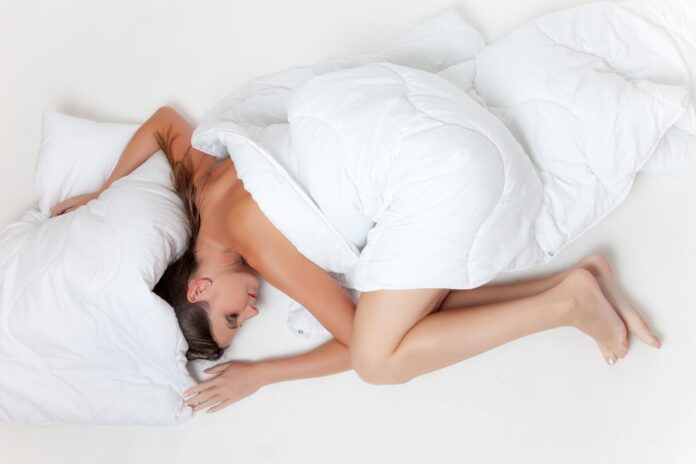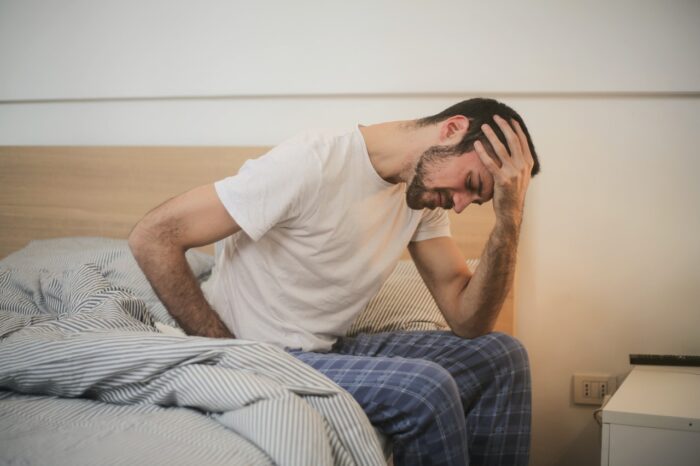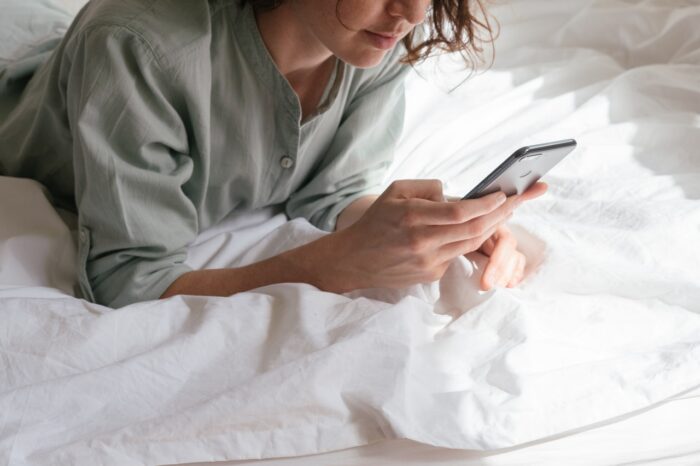
You need to relax and get sleep. How much sleep you need depends, but sleep loss, over time, may contribute to diminished vision and judgment and chronic exhaustion – among other problems.
Be vigilant to certain behavioral patterns and environmental causes that might be a mess in your sleep – and know how to remedy them – so that you will wake up feeling well-rested.
Eating a Large Meal Before Bed

There is nothing like a full bladder or a stomach that will interrupt your night. Standing up to urinate can disturb the sound of relaxation. Having so much before bed will imply several visits to the toilet through the night. Eating a big meal before bedtime can induce heartburn symptoms as you lay down, which may make you uncomfortable. Obstructive sleep apnea may also cause overnight nocturnal and heartburn.
Lying Awake in Bed
When you are having problems trying to sleep, the last thing you need to do is lay up. If this occurs regularly, as might be the case with insomnia, you can begin to equate your bed with fear and not to sleep. Seek a calming habit like reading instead of tossing and turning. When you are still tired, get out of bed and get your night again.
Sleeping Somewhere Too Cold, Too Warm, or Too Noisy

There is no good attempting to sleep anywhere that activates our senses. When the radio is blaring, the lights are on, and it is suffocating, how do you hope to sleep? Subtle variants on this theme can find it hard to catch a few winks as well. Hold the space cozy with low illumination, low noise, and low temperature.
Taking Long Naps
The next one may be a bit contentious. Many communities encourage midday sleep, and other people swear by it. It might not be a concern if you sleep well at night. However, if you have problems sleeping; otherwise, the last thing you need to do is add fuel to the flames by sleeping throughout the day. Naps reduce the sleeping capacity at night, and prolonged sleepiness during the day will contribute to sleeping disorders such as sleep apnea.
Blue Light
Filling your bedroom with televisions, game consoles, laptops, phones, and other electronics would guarantee that a variety of stimuli is available. Sadly, neither of them is likely to make you sleep easier. Blue light from devices may be detrimental to sleep. That said, Celluma told us that blue light therapy can also be a solution to help with acne treatment.
Having them right before bed is going to keep your brain busy, so that is the last thing you need to fall asleep. Pack your cell in the kitchen and remove the electronics from your sleeping sanctuary.
That’s why I would suggest you use red light therapy for sleep, according to experts, this technology can undo the damage done by blue light by fixing your sleeping schedule. This kind of light therapy comes without any side-effects, so it’s completely safe to use.
Drinking Coffee, Alcohol, or Smoking Before Bed
While grandpa might have also liked an alcoholic nightcap to get to sleep, this is not really helpful. Alcohol may make you feel a little tired, but it breaks the phases of your sleep and renders it more disturbing when it wears off. Snoring and sleep apnea can intensify if eaten before bedtime. Caffeinated liquids like coffee, tea, ice pop, and chocolate-filled products act as stimulants that hold you alive for hours. Caffeine can be stopped in 4 to 6 hours before bedtime or sooner if you are susceptible to its effects. Likewise, the nicotine from a cigarette is going to kill your sleeping capacity, and the pain associated with withdrawal can wake you up throughout the night.
Sleeping Less When You’re Busy

We are always busy on several occasions, so it is easy to find more room throughout the day by sleeping fewer. How do you spend 8 hours in bed? Should you not rather watch TV, play on the phone, or spend time with your friends or family? Sadly, the efficiency of the period we spent awake is significantly compromised by not having enough rest. If you cut down on sleep, you may notice that you do not get anything because you spend the day bleary-eyed and bleary-eyed. Have enough rest in bed to satisfy the needs of the family every night.
Staying Active Until the Moment Before Hopping Into Bed
Sleep is a peaceful, calming practice. It does not make any sense to attempt to create a straight transition towards anything that is just the contrary. Our brains are not doing good with sudden shifts. The same is correct about being ready to sleep. Pleasant sleep habits, such as reading, listening to soothing music, or having a relaxing soak, help us plan for sleep emotionally and physically. Spend 30 to 60 minutes until bedtime, preparing the body and mind for sleep.
Exercising Vigorously Before Bed

While it is reasonable for 30 minutes of exercise a day — and that is likely to ensure a decent night’s sleep — doing so just before bed is definitely a poor idea. This creates problems because your body is going to be resurrected as you are supposed to be slowing down. It can increase your body’s temperature, heart rate, and blood pressure.3 Should not get sweaty from your exercise. Consider avoiding physical activity just before bedtime. It is the only time of the day you can manage to get the workout completed.
Varying Your Sleep Time From One Day to the Next
We are beings of habit, so sleep is no different. When you go to bed and wake up at various hours of the day, your body may have no idea of when it is meant to be exhausted and asleep. It mainly relies on our internal clock called the circadian rhythm. Many hours we are sleeping will adversely affect it. Through maintaining a regular routine, we are more able to sleep. Start by setting your wake time with an alarm and heading to bed when you feel exhausted. This means that you get enough hours regularly to satisfy your sleep needs.
The Bottom Line
When you have disrupted your night, get support, and get back on track by contacting a board-certified night practitioner. Easy strategies and, if possible, a standardized cognitive-behavioral insomnia therapy (CBTI) program can help you overcome your sleeping difficulties.








